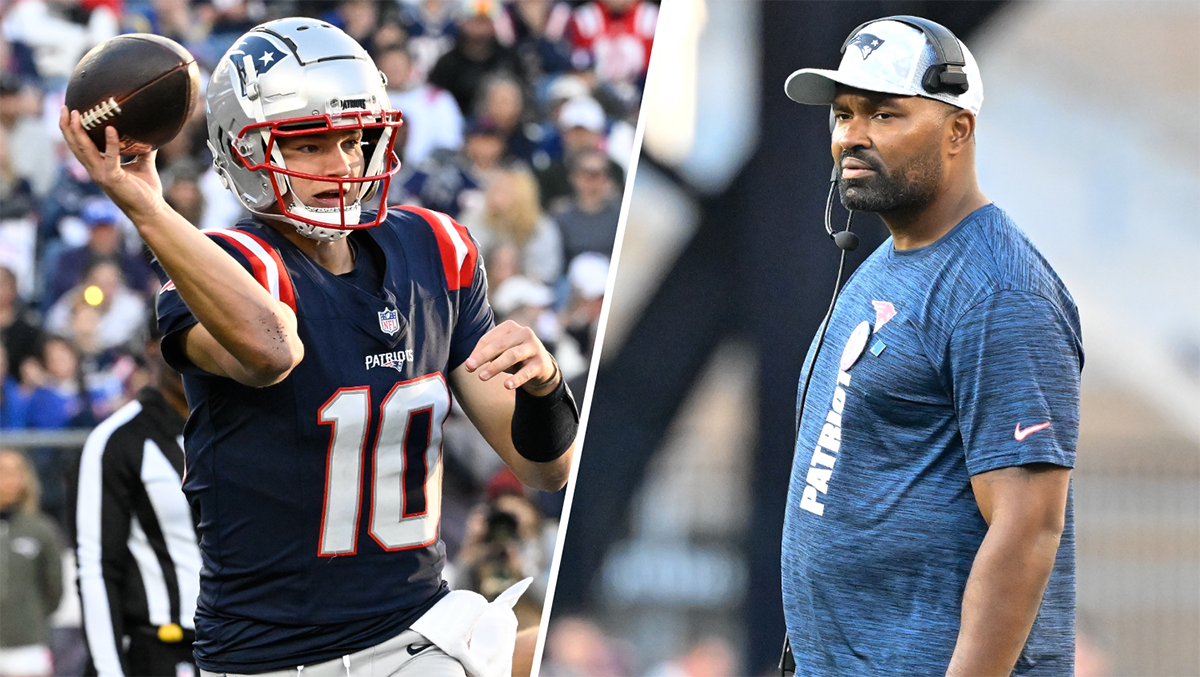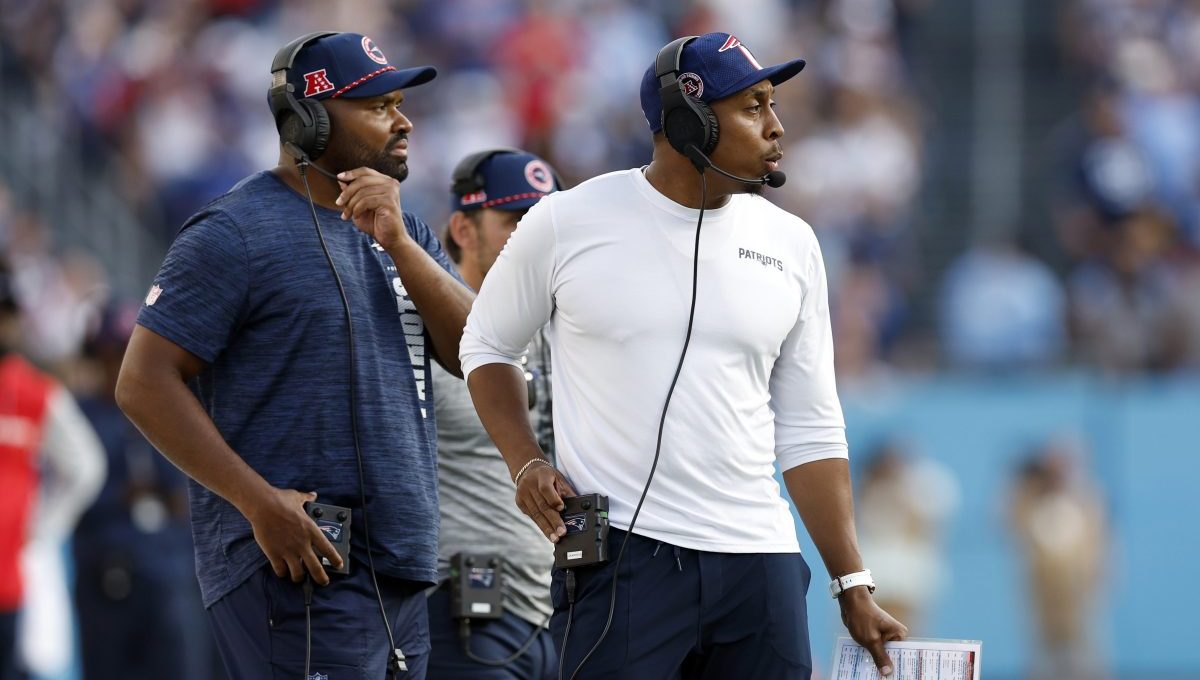There’s no questioning whether the “soft” grenade Jerod Mayo lobbed in London on October 20 had the desired effect.
At that point the team was 1-6, had been blasted in four of its five previous games and lost to Snoop Huntley and the Dolphins in the other. Since that day -- a convincing loss to the disastrous Jaguars -- they are 2-2 and quite easily could be 4-0.
WATCH ANYTIME FOR FREE
>Stream NBC10 Boston news for free, 24/7, wherever you are. |
The Patriots are creeping toward mediocrity, separating themselves just a bit from stale and still-sinking teams in Dallas, New York, Jacksonville, Cleveland and Vegas. Toss in Carolina and Tennessee as well if you want to.
They’re not objectively good. God no. But instead of being between the 28th- and 32nd-best team in the league, they’ve probably rocketed up to the 23-to-26 bracket. Baby steps.
Get updates on what's happening in Boston to your inbox. Sign up for our >News Headlines newsletter.
But attached to the modest improvement are rising expectations. Stuff you might have shrugged at a few weeks ago and said, “Whatcha gonna do? They stink right now…” is less excusable. Scheme, in-game decision making, player gaffes and breakdowns are all in for heavier scrutiny.
And there’s a ton to scrutinize from Sunday’s 28-22 loss to the Rams. So let’s attack in bullet-point fashion.
MORE PATRIOTS COVERAGE
Zero logic
There’s a time and a place for a zero blitz.
The time is NOT on the second play of the second half when you are already down 14-10 and you are facing a 16-year veteran quarterback who’s seen everything there is to see. Especially when he’s got an All-Pro wideout that he shares a brain with at his disposal.
Because if you fail -- as the Patriots did when they blitzed Matthew Stafford and he hit Cooper Kupp for a stroll-in 69-yard touchdown -- you are down 11. Right out of the locker room.
a nice way to start the second half
— Los Angeles Rams (@RamsNFL) November 17, 2024
📺: @NFLonFOX | #RamsHouse pic.twitter.com/syIB0F7CT9
Who knew? The Patriots should have. In Week 2, they sent the house against a lesser veteran quarterback, Geno Smith, near the end of the first quarter. The Seahawks quarterback sniffed it immediately and threw a 56-yard touchdown pass to D.K. Metcalf to tie the game at 7. That was on a second-and-5. The one Sunday was on a second-and-9.
What are you going to gain? A sack? An incompletion? A pick? And even if you do come up with a pick, are you going to score six off of that? Because if you screw up the zero blitz, you’re going to give up six.
Asked Monday morning about the decision, Mayo said, “You hit it on the head, the risk-reward. We felt like that was a good time to call that blitz. We called it a couple times in the game. Sometimes it was a run play, and it gave us some movement up front.
"When that happened on that big play, it was just we didn't get there in time, and it was poor coverage on the outside."
Selective aggression
Which brings me to the next nit to pick. What’s the overarching in-game philosophy in terms of aggressiveness? As Phil Perry said during Patriots Postgame Live, “If you’re gonna be a bear, be a grizzly.”
Rolling the dice with zero blitzes and playing risk-reward is a path, certainly. But if you’re going to be Riverboat Jerod, then have at it.
I’m thinking specifically of the play-calling once the Patriots got to second-and-4 at the Rams 22 while trailing 28-19 with six minutes remaining. There was a 3-yard run by Rhamondre Stevenson up the middle. Then another for no gain.
Then they lined up to go for it on fourth-and-1 with some apparent chicanery using rookie wide receiver Ja’Lynn Polk alongside rookie Drake Maye. Polk has been kind of a mess all year. He’s got half as many catches since September as he does penalties.
Somewhat predictably, Polk jumped. Flag. False start. Field goal.
How could they have known Stevenson would go nowhere on gotta-have-it short yardage? Perhaps because, in the third quarter, trailing 21-10 after the zero-blitz TD was allowed, the Patriots got down to the Rams' 5-yard line. There was a dicey incompletion by Maye intended for Hunter Henry. Then a Stevenson carry up the middle for 3.
On third-and-goal from the 2, instead of getting the athletic-and-tough Maye moving on the edge and taking advantage of his versatility -- especially when the line was STACKED to stop Stevenson -- the Patriots rammed it up in there. Henry missed a block, but even if he’d gotten it, there was no push from the offensive line. So now it’s fourth-and-goal from the 2.
And after giving up a free seven by taking a risk, Mayo decided to play conservative and kick the short field goal.
It’s like sitting next to somebody at a $10 blackjack table and seeing the guy lay down $10, $10, $10 then $100 on a whim. I mean … it MIGHT work but … why?
Learning on the job
Less offensive? The decision at the start of the second quarter to punt from the Rams 37 rather than attempt a 54-yard field goal. Up 7-0, it’s not a bad idea to show Stafford proper deference and not run the risk of him starting a drive from the spot of the kick at his own 44.
Now, they were at the 37 because Vederian Lowe was called for illegal formation on a third-down play. And punter Bryce Baringer promptly blasted his punt into the end zone for a net 22-yard punt. And Stafford went 80 yards in nine plays to tie the game.
But the conservative play there didn’t bother me. Because I understood the logic. It was a 51-49 call. I got the risk-reward balance. Didn’t work out. But I got it.
Monday morning, Mayo acknowledged that all of these scenarios -- and there have been dozens -- have been worth looking back on.
“I don't want to use the word regrets, but I've been very open,” he said. “Being a first-year head coach, I'm learning as well, and it's a good experience. Like you said, hindsight is 20-20, but that was the decision I made during the game that I thought gave us the best chance to win the football game.”
Mayo then was asked about a default philosophy for how to attack situations. Like the Lions seem to have with Dan Campbell always being on attack.
🔊 Patriots Talk Podcast: "11 minutes from hell" for Pats defense the difference in loss to Rams | Listen & Subscribe | Watch on YouTube
“In my opinion, it's a case-by-case, like how the game is going, what the flow of the game is,” he said. “Like I said, in the moment, I always feel like I'm making the right decision.
"It's very easy to look back and say, ‘Well, I wish I would have done X, Y, and Z,’ and that would be multiple situations. You can go back to the London game and then some of the same situations showed up (Sunday). If you execute, we're not having this conversation. But as I sit here today, look, it's 100 percent on me, and I have to be better.”
Nobody was more malleable to situations than Mayo’s predecessor, Bill Belichick. He could read the game brilliantly. Incomparably. But a huge, huge part of that was his consigliere Ernie Adams and trusted assistants who shared a football mind and operated on the same philosophical frequency as Belichick.
The other part was that he had a team talented and well-coached enough to make their performances much more predictable than Mayo is bound to get from his developing team.
So, in my opinion, there’s the reason we spend a lot of Mondays wondering why decisions were made and not getting satisfying answers beyond, “Thought it would work … it didn’t.” It doesn’t excuse the decisions or the lack of consistency we see in the way they are made. It only helps to explain them.
And as the Patriots creep further away from horrible and closer to below-average, there will be more and more games decided by seven points or less. And more decisions to deep-dive when they go wrong.
The on-field performance fluctuations are part of the growth of a young team tethered to a 22-year-old quarterback. And maybe the consistency of the decision-making is too. But if the Patriots are going to get from where they are to “good," they need to figure out what kind of bear they’ll be.




